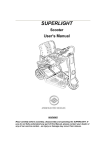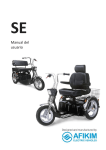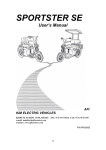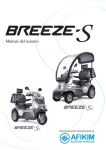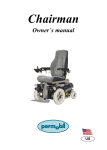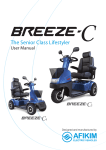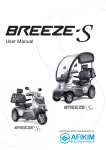Download WHEELCARE SUPERLIGHT User`s manual
Transcript
SUPERLIGHT Scooter User’s Manual WHEELCARE, Inc. 12691 Monarch Street Garden Grove California 92841 Tel 800-448-5999 , 714-230-6132 Fax 714-230-6154 WARNING Read carefully before assembly, disassembly and operating the SUPERLIGHT. If you do not fully understand any part of this Manual, please contact your dealer or any of our service centers as injury or damage may occur from misuse. WARNING Electromagnetic Interference (“EMI”) can cause powered vehicles to behave erratically, which could be dangerous to the user. For your safety and protection, it is IMPERATIVE that you take time to read Chapter 11 (“EMI WARNING”) before operating SUPERLIGHT or any other powered vehicle. If further clarification is required, please contact your dealer or any of our service centers: see the back cover of this User’s Manual. The SUPERLIGHT passed the EMI testing: See Chapter 11. Serial Number Label is affixed to the Tiller: See Fig 10. CONTENTS Page Subject CHAPTER 1 - DELIVERY and UNPACKING ..................................... 1 CHAPTER 2 - ASSEMBLY................................................................ 3 CHAPTER 3 - OPERATING INSTRUCTIONS ................................ 17 CHAPTER 4 - DISASSEMBLY......................................................... 25 CHAPTER 5 - THE CHARGER........................................................ 33 CHAPTER 6 - STORING IN CAR ..................................................... 37 CHAPTER 7 - TROUBLESHOOTING.............................................. 39 CHAPTER 8 - SAFETY INSTRUCTIONS....................................... 42 CHAPTER 9 - SERVICE .................................................................. 44 CHAPTER 10 - SPECIFICATIONS.................................................. 47 CHAPTER 11 - EMI WARNING ....................................................... 49 A CHAPTER 1 - DELIVERY and UNPACKING The SUPERLIGHT Scooter is delivered to you packed in 2 Cardboard Boxes. . Note: The boxes weights 30+28kg (66+62 lb.) - do NOT attempt to lift it without assistance. 1.1 Unpack as follows (See Fig. 1) a. Place boxes on floor with side up as marked by the arrows on the side of the box. b. Cut the Plastic Bands. c. Remove the cardboard Top Cover. d. Remove all parts from the boxes (and lay on the floor) e. Identifying the SUPERLIGHT Components (See Fig. 1) (1) Batteries Cover (6) Charger (2) Rear Wheels (7) Seat Adapter (3) Frame (8) Tiller (4) Seat (9) Rear Basket (5) Batteries (left & right) 1 Figure 1. 2 CHAPTER 2 - ASSEMBLY 2.1 Installation of Rear Wheels (See Fig. 2) a. Squeeze the center Pin in the Hub Cap. Push the wheel back on, to the end of the axle. WARNING After installing the wheel please check carefully that it is properly positioned and secured back in place. b. To assure that the wheel is secured in its place, try to pull it off axle without touching the Pins. The wheel should NOT come off. If necessary repeat procedure a. above. 3 Figure 2. 4 2.2 Joining Tiller to Frame. a. Place Tiller in front of the Frame. (See Fig. 3). Kneel at the left side of the SUPERLIGHT holding the left side of the Top Handle Bars of the Tiller with your left hand. The Tiller should be vertical and slightly inclined backward as shown in Fig. 3. b. With your right hand lift the Housing (at the front end of the Frame) and place it above the (black) Tapered Pin mounted on the Tiller. c. Let the Housing slide down onto the black Tapered Pin until you hear a “click”: at this time the Retaining Spring should engage the Groove on the Tapered Pin thus locking both sections to each other. 5 Figure 3. 6 2.2 Joining Tiller to Frame. (Cont.) d. Connect the Electric Plug to the Socket in the Tiller (See Fig. 4). Figure 4. 7 2.3 Installation of Batteries (See Fig. 5) Note: Installation of L.H Battery is identical to R.H. Battery. L.H. Battery is shown. a. Place battery in its location on the frame. b. Connect Battery Plugs to battery. Figure 5. 8 2.4 Installation of Batteries Cover (See Fig. 6) a. Place Batteries Cover over the Batteries b. Push back Plastic Clip to secure the Batteries Cover in its location. 9 Figure 6. 10 2.5 Seat Installation (Figure 7) Seat Installation and Adjust: a. Insert the Seat Adapter into the SeatBushing. (1) Verify that the Seat-Bushing slot is in forward direction. (2) Install bolt and washer and tighten the bolts very well, using the attached wrench. (3) Install and tighten the securing nut very well, using the attached wrench. (4) Install the Seat into the SeatBushing while the Seat is 45 degree to the side of the frame. (5) Press the Seat Turning Lever to place the Seat forward position. b. Adjusting the height of the Seat. Remove nut, bolt and washer. Change the Seat Adapter height, install, bolt and washer and tighten strongly tightened and tighten the securing nut very well. c. Install Seat Upholstery. 11 Figure 7. 12 2.6 Rear Basket Installation a. Install the Rear Basket by placing it on Support Rod welded to the rear frame. (See Fig. 8). Figure 8. 13 2.4 After the assembly make sure that: a. All parts are undamaged, properly assembled and secured. b. All electrical plugs are properly fastened. c. The operating levers return automatically to center position when they are squeezed and released. It is recommended to charge the batteries overnight before operating the SUPERLIGHT for the first time. See Chapter 5 for charging instructions. 14 2.5 Seating into the SUPERLIGHT a. For comfort entering into the SUPERLIGHT (See Figure 9). b. Lift the Seat Turning Lever and turn the Seat 45 or 90 degree to the side of the frame. c. Sit down and turn swivel back towards the front of the vehicle while the lever is still pulled up. d. Use the Seat Slider Lever to adjust the Seat forward/Backward (See Fig. 9). e. Fold the Seat Armrest as desired while getting in or out of the vehicle. Note: For your safety, always keep the armrest closed: Forward – Down while seated. 15 Figure 9. 16 CHAPTER 3 - OPERATING INSTRUCTIONS PLEASE READ THOROUGHLY CHAPTER 8 - “SAFETY INSTRUCTIONS” - BEFORE DRIVING THE SUPERLIGHT. 3.1 Mount the SUPERLIGHT, insert the Key into the Slot and turn it clockwise to the (marked) ON position. The Key will remain in this position. Panel On Light should come ON. (See Fig. 10). 3.2 You can drive forward by gently squeezing the Right Hand Operating Lever. You can drive reverse by gently squeezing the Left Hand Operating Lever. − The speed of the SUPERLIGHT is proportional to the deflection of the Levers; the more you squeeze the faster you go (either direction). 3.3 TO STOP : Release the Lever - it returns automatically to its center (neutral) position and the SUPERLIGHT stops. Note: For your safety and comfort the following features are part of the normal operating sequence; - Slight delay after you squeeze the Lever before the motor is engaged- - When squeezing or releasing the Lever you should hear a “click” indicating that the Electromagnetic Brake is activated. 17 Figure 10. 18 3.4 The SUPERLIGHT has 2 speed modes ; Low / High a. In the High speed mode (marked by the “hare” symbol next to the Speed Selector switch) the maximum attainable speed is 7.5 km/h (4.6 mph) When selector is in High Speed Mode – Green light of switch is ON. (See Fig. 11). b. In the Low speed mode (marked by the “turtle” symbol next to the Speed Selector switch ) the maximum attainable speed is 4.5 km/h (2.8 mph).* * When selector is in Low Speed Mode – Green light of switch is OFF. (See Fig. 11). Notes: 1. There is available a model of SUPERLIGHT in which the maximum speed is 6.0 km/h and the low speed is 3.0 km/h. 2. The manufacturer to client’s requirement can limit the speeds. Contact your dealer or our service center WARNING 1. Until you get used to the SUPERLIGHT and its operational features - Speed Selector switch should be set at the Low mode (“Turtle”). 2. When going down hill always use the low speed mode. 3.5 Set the Speed Selector switch as desired. 3.6 When “extra-power” is needed (i.e., climbing allowed slopes) use the High speed mode. 19 Figure 11. 20 3.7 Lights Operating (See Fig. 12) To switch on the SUPERLIGHT light, use the RightBlue switch . . 3.8 Battery Capacity Indicator (See Fig. 12) The Battery Capacity Indicator is part of the Disply Panel. The indicator contains 4 left leds . The battery capacity is proportional to the numbers of the illuminated leds. (Not include the ON led). Thus 4 Illuminated leds means: 75%-100% capacity. Thus 3 Illuminated leds means: 50%-75% capacity Thus 2 Illuminated leds means: 25%-50% capacity Thus 1 Illuminated leds means: 0%-25% capacity Notes: 1. The Battery Capacity Indicator reset itself to full (4 leds) only after full recharge. 2. In case that Charging Adapter is used to charge the Batteries out of the SUPERLIGHT, the Battery Capacity Indicator of the vehicle will not reset automatically To reset the Battery Capacity Indicator Turn on the key switch and wait for 2 minutes without driving Note: We recommend charging the batteries at the end of each day. 21 Charging fuse Figure 12. 22 3.9 In case of power fail, low battery or other fail The SUPERLIGHT can be pushed manually by turning the Motor Cap Knob in clockwise (See Fig. 13) and pushing the SUPERLIGHT by hand. The SUPERLIGHT will not operate and the buzzer will beep until the Motor Cap Knob is turned back to its original position. (The buzzer will operate only when the key switch is in “ON” position). 23 Figure 13. 24 CHAPTER 4 - DISASSEMBLY 4.1 Separation of Tiller from Frame (See Fig. 14). For ease of operation we recommend working on the left side of the SUPERLIGHT (facing forward ): a. Disengage the Electric Plug from its socket in the Tiller by squeezing the Snap Button (located on the plug) - and pull. b. Support the Tiller with your left hand holding the Upper Left Rail. c. Push the Retaining Spring with the thumb of the right hand until it is freed from the Groove on the (black) Tapered Pin. d. Carefully lift the Frame off the Tapered Pin and lay both sections on the floor. 25 Figure 14. 26 4.2 Removal of Seat (See Fig. 15) a. Remove the Seat from the Seat Adapter by lifting the Seat straight up while turning Release Lever is pulled only when the Seat is 45ºback direction to the left. b. Remove the Rear Basket by lifting it up from its Support Rod. 27 Figure 15. 28 4.3 Removal of Batteries Batteries can be easily removed from your SUPERLIGHT as follows a. Remove Seat and Rear Basket (see instructions in paragraph 4.2 above). b. Open Batteries Cover - (See Fig. 16). 1) Pull back Plastic Clip 2) Tilt and lift up Cover as shown Figure 16. c. Disconnect cables from batteries: unplug Battery Plugs. 29 d. Remove each battery BY PULLING UP THE HANDLE AND LIFTING THE BATTERY (See Fig. 17). WARNING Failure to follow above instructions could cause pinching of your hand or fingers if battery slides down and causes hand to come in contact with other parts. Main Fuse On battery Figure 17. 30 4.4 Removal and Installation of Rear Wheel/s (See Fig. 18) Rear Wheel/s can be removed to facilitate storage at home, in the trunk of your car or for general service. WARNING Before attempting to remove Rear Wheel/s, you need to support the SUPERLIGHT by inserting any support block under the Frame. The block should be large and strong enough to allow the wheel/s to clear the ground by approximately 3-4 cm (1.2-1.6 inch). REMOVAL a. Squeeze the center Pin in the Hub Cap and pull the wheel off the axle. INSTALLATION b. Squeeze the center Pin in the Hub Cap. Push the wheel back on, to the end of the axle. WARNING After installing the wheel please check carefully that it is properly positioned and secured back in place. c. To assure that the wheel is secured in its place, try to pull it off axle without touching the Pins. The wheel should NOT come off. If necessary repeat procedure b. above. 31 Figure 18. 32 CHAPTER 5 - CHARGING BATTERIES The Battery Charger supplied with your SUPERLIGHT controls the charging operation, prevents over-charging and prolongs the life of the batteries. Read chargers instructions carefully before using the charger. Note: There is no ON/OFF power switch to the charger. 5.1 Charging Batteries (See Fig. 19) a. Insert the Charging Plug into the Charging Socket in the right hand side of the Tiller of the SUPERLIGHT. b. Plug the power cord of the Charger into a wall outlet. c. The Charger Lamp will show as follows: Red – Charger Cord is plugged into the wall outlet. Yellow – Charging Green – Battery are fully charged . 33 Figure 19. 34 When charging is complete and you are ready to go - unplug the Charger from the wall outlet and then pull out the charging plug from the charging socket. d. Under ideal storage conditions, batteries which were charged to full capacity and not used - will remain charged for approximately 6 months. e. If you are planning not to use your SUPERLIGHT for an extended period of time, we recommend charging it for two days and then disconnecting the batteries. f. If you have not used your SUPERLIGHT for an extended period of time, charge the batteries for at least 12 hours before driving. Notes: • There is NO need to disconnect the Charging Plug promptly after the charging is complete. • HOWEVER, do not leave the Charger connected to the batteries for more than two weeks. • As long as the Charging Plug is in the Charging Socket, the electronic control of the SUPERLIGHT automatically cuts all power to the motor and the SUPERLIGHT can not be driven. 35 5.2 Charging Adapter (Optional) The Charging Adapter enables charging the batteries when they are removed from the SUPERLIGHT. This is needed when a wall outlet is not available close to the SUPERLIGHT’s position, when you have extra set of batteries, or when the SUPERLIGHT is stored . In such cases you can remove the batteries from the SUPERLIGHT (as per the instructions in Chapter 4) and use the Charging Adapter to charge the batteries. a. Connect the two Electrical Plugs of the Charging Adapter to the two batteries. b. Connect the Charging Plug of the Charger to the Charging Socket in the Charging Adapter. c. Connect the Charger to a wall outlet. − The charging process described in paragraph 5.1. Note: See relevant battery capacity indicator instructions (paragraph 3.8) when using charging adapter. . In case that Charging Adapter is used to charge the Batteries out of the SUPERLIGHT, the Battery Capacity Indicator of the vehicle will not reset automatically To reset the Battery Capacity Indicator Turn on the key switch and wait for 2 minutes without driving 36 CHAPTER 6 - STORING IN CAR See Fig. 20 The SUPERLIGHT design, its small dimensions and low weight allow for easy and simple storage and transportation in almost all types of cars. 6.1 Take off the Seat and the Rear Basket. 6.2 Separate the Tiller from the Frame following instructions in Chapter 4. WARNING Never try to lift a fully assembled Frame by yourself as it is heavy and weights 26.0 Kg (57.2 lb.) without the Seat and the Rear Basket. 6.3 You can store the SUPERLIGHT in a car AFTER disassembling the Seat, Basket and Batteries. If necessary take off also the Rear Wheel/s (refer to Chapter 4 for instructions). WARNING The Frame as described in paragraph 6.3 weights only 10.6 Kg (23.3 lb.) However user should be aware of his capabilities and should refrain from attempting to lift this load if it exceeds whatever he is allowed to lift. 6.4 With the help of another person you can lift the complete Frame and place it in the trunk. 6.5 In both cases (paragraph 6.3 and 6.4), store the Tiller, the Seat and the Basket on top or alongside the Frame - as space allows: take steps to assure that the sections and the parts do not rub against each other. 37 Figure 20. 38 CHAPTER 7 - TROUBLESHOOTING No. Trouble Probable Cause 1 - Cables not properly connected or need repair Green Lamp not ON when Key is turned, Or the Green lamp is Flashing Corrective Action - Check cables and reinsert all connections. If the problem is not resolved call your dealer or Service Center - Main fuse on battery - Reset the fuses assembly poped out See figure 17 or electrical failure (Maximum 2 times) - electronic system - turn off – on the failure. key - Call dealer or Service Center 2 Battery capacity Indicator show low capacity - Batteries need recharging 3 When squeezing Operating Lever a “click” is not heard - The Electro Magnetic - DO NOT DRIVE Brake is out of order. SUPERLIGHT Call dealer or Service Center 4 When squeezing - The Lever (internal) Operating Lever Spring is broken or (either left or right) and displaced releasing it the Lever does not return to the neutral position. 39 - Recharge Batteries - DO NOT DRIVE SUPERLIGHT Call dealer or Service Center CHAPTER 7 - TROUBLESHOOTING (Cont.) No. Trouble Probable Cause Corrective Action 5 Drive is not smooth or drive is irregular. - Batteries not charged, or - Batteries need replacement - Charge Batteries; if problem not resolved:- Replace Batteries. - Call dealer or Service Center 6 Buzzer beeps and - Manual release knob - Turn back the motor vehicle does not move at top of motor cover knob when squeezing is turned - Call dealer or Service operating lever. Center 40 BATTERY CHARGER - TROUBLESHOOTING No. Trouble 1 2 3 Probable Cause Corrective Action Charger indicator is not ON while the charger is plugged into wall outlet Faulty charger Replace charger Charger indicator does not change color to yellow or green when the charging plug is inserted into socket in tiller Loose contact between plug and socket Pull plug and insert again. Charging fuse popped out Green light does not Batteries not fully charged yet turn ON after more then 20 hours -----------------------Old batteries -----------------------Charger needs repair 4 The Battery Indicator Faulty charger does not reset into The key switch was full battery charge Turn off during after full charging charging 41 Reset the charging fuse on tiller (see fig. 12) If problem recurs call Service Center Continue charging overnight If problem persists call Service Center ------------------------Call Service Center Replace charger Turn on the key switch for 2 minutes Without driving CHAPTER 8 - SAFETY INSTRUCTIONS The SUPERLIGHT can be operated indoors, as well as outdoors on flat paved surfaces. Please note and strictly adhere to the following Safety Instructions. Additional Warnings and Notices are printed in this USER’S MANUAL ; it is imperative that you read carefully all chapters of this Manual before operating the SUPERLIGHT. It is also advisable to refresh your memory by re-reading this Manual every few months or as applicable to user’s memory. 8.1 Get acquainted with the SUPERLIGHT and its operational features before driving it. Drive very slowly until you get used to the SUPERLIGHT, to its different functions and safety features, to its braking capabilities and limitations. 8.2 Due to the low ground clearance, It is strictly forbidden to climb up or down any obstacle exceeding 6 cm (2.3”). 8.3 Watch carefully for pedestrians and drive your SUPERLIGHT accordingly. In crowded area always drive with Speed Selector set on Low (turtle). 8.4 Drive ONLY where permitted according to all applicable laws and ordinances. 8.5 DO NOT turn the Key to the OFF position while in motion; this may cause abrupt and excessive deceleration which in turn may cause injury to user and damage to the SUPERLIGHT. 8.6 The load in the rear basket should not exceed 10 kg ( 22 lb.). 42 8.7 The SUPERLIGHT is designed and built to be carry ONE person only: Never operate it with an additional person or child on board. 8.8 CLEANING : Never use a hose ; this may severely damage the power and electronic components. Clean your SUPERLIGHT using only a damp cloth with mild detergent. 8.9 Emergency Braking in case of danger when driving forward, Squeeze Reverse Lever to stop. In case of danger when reversing - squeeze the Forward Lever. This may cause abrupt and excessive deceleration which in turn may cause injury to user and damage to the SUPERLIGHT. WARNING Persons with impaired capacity and/or untrained persons should not operate the SUPERLIGHT under any conditions. Special care must be exercised to prevent children from operating the SUPERLIGHT. 8.10 Emergency Moving. In case of emergency cases, to move the vehicle when there is a fail on control or battery system:- Turn the Motor Cap Knob at the top of the motor in ClOCKWISE direction and push the SUPERLIGHT by hand forward or reverse as needed. 43 CHAPTER 9 - SERVICE Your SUPERLIGHT is designed and built to provide a long, useful and troublefree life. Occasionally it may require service depending on the conditions and environment to which it was exposed. We recommend that for service and repair you maintain contact the authorized dealer where you purchased your SUPERLIGHT. If this is not possible, please contact one of our Service Centers and we will either assist you over the telephone or provide you with the name and address of the nearest authorized service where you can receive immediate assistance. The SUPERLIGHT needs little periodical service, but when it does it should be carefully performed at specified times to avoid risk of failure and to insure continuous and smooth operation. When servicing the SUPERLIGHT, park it on level surface and keep the key disengaged. 44 Periodical servicing requirements No. Service Frequency 1 Check tires for damage and replace if necessary. Every two Month 2* General check of screws tightening. Every half year 3* Inspection of electromagnetic brake Every half year 4* Inspection of the wheel bearing for excessive wear Every half year 5 Cleaning As required * Those technical operations for the vehicle should be done only by a trained and authorized technician. 9.1 Tires and air pressure inspection As standard, the SUPERLIGHT is supplied with PU (Polyurethane) tires which does not need any service. In case of using air tires: a. Normal air pressure in the SUPERLIGHT tires is essential for retaining the vehicle’s travel ability and stabilization. b. The tires should be inspected for external completeness and general condition, and for proper seating of the tire on the entire wheel perimeter. 45 c. The air pressure of the tires should be inspected every two weeks, especially after a long storage time period. d. Normal tire air pressure - 36 psi (2.4 bars). e. Air pressure may be replenished or inspected in gas stations or by a foot/hand pump equipped with pressure gage. 9.2 Cleaning NOTE: The SUPERLIGHT should be cleaned with water and soap only. Do not clean the vehicle with a water jet stream. a. Clean the external assemblies only. b. Upon completion of the cleaning, wait for parts to dry. 46 CHAPTER 10 - SPECIFICATIONS * DIMENSIONS: Width Length with straight handlebars Height of seat from floor Ground clearance WEIGHTS : Tiller Frame - complete Frame (without: wheels, batteries, seat, basket) Batteries (each) Wheel (each) Seat OPERATIONAL CHARACTERISTICS: Speed (Speed Selector switch) Forward HIGH up to Forward LOW up to Reverse up to Maximum allowed load Maximum rear basket load Metric (cm) 62 115 55-60 7.5 Metric (kg) 10.3 36.5 10.6 6.8 0.9 9.9 Metric 7.5 km/h 4.5 km/h 4.5 km/h U.S. (inches) 24.4 45.3 21.5-23.6 3.0 U.S. (lb.) 22.6 80.3 23.3 15.0 2.0 21.7 U.S. 4.7 mph 2.8 mph 2.8 mph 110 10 kg kg 240 lbs. 22 lbs. Maximum traveling distance with fully charged batteries (user weight 75 kg, level surface, high speed) 20 km 12.5 miles Maximum downhill slope allowed Maximum uphill climb (slope) allowed Turning radius Minimum safe turning radius 13 % 13 % 70 cm 80 cm OPERATIONAL CHARACTERISTICS: 47 Metric 7.4 deg. 7.4 deg. 27.5 inch 31.5 inch U.S. (Cont.) Maximum allowed side angle 13 % 7.4 deg. WHEELS & MARKINGS ON TIRES: Front - Solid, φ250 mm x 50 mm Rear - Solid, φ250mm x 50mm, MAX. , quick release GENERAL: Drive Motor/Gear Batteries Controls Braking EMI immunity level Front wheel Direct drive 2 x 18 Ah, 12V As per ISO 7176. Automatic /Electromagnetic Braking + Manual Release 20 V/m CHARGER: Output Input Fuse Charging time for empty batteries 1.5 Amperes, 24 Volts 85 V to 250 V AC As marked on charger label 10-12 hours OPTIONS: • Front Basket • Charging Adapter • Left seat • Charger form cigarette lighter socket of car * All specifications are subject to change without notice 48 CHAPTER 11 - EMI WARNING All types of electrically powered vehicles, such as powered wheelchairs and motorized scooters (in this text all types will be referred to as “powered vehicles”) may be susceptible to electromagnetic interference (EMI), which is interfering electromagnetic energy (EM) emitted from sources such as radio stations, TV stations, amateur radio (HAM) transmitters, two way radios and cellular phones. The interference (from radio wave sources) can cause the powered vehicle to release its brakes, move by itself, or move in unintended direction. It can also damage the powered vehicle’s control system. The intensity of the interfering EM energy can be measured in volts per meter (V/m). Each powered vehicle can resist EMI up to a certain intensity. This is called its “immunity level”. The higher the immunity level, the greater the protection. At this time, current technology is capable of achieving at least 20 V/m immunity level, which would provide useful protection from the more common sources of radiated EMI. This SUPERLIGHT as shipped with no further modification, has an immunity level of 20 V/m. There are a number of sources of relatively intense electromagnetic fields in everyday environment. Some of this sources are obvious and easy to avoid. Others are not apparent and exposure is unavoidable. However, we believe that by following the warning listed below, your risk of EMI will be minimized. The sources of radiated EMI can be broadly classified into three types: 1) Hand held portable transceivers (transmittersreceivers) with the antenna mounted directly on the transmitting unit. Examples include: citizen band (CB) radios, “walkie talkies”, security, fire and police transceivers, cellular telephones and other personal communication devices. ** NOTE: some cellular telephones and similar devices transmit signals while they are ON, even when not being used. 49 2) Medium range mobile transceivers Such as those used in police cars, fire trucks, ambulances and taxis. These usually have the antenna mounted on the outside of the vehicle, and 3) Long-range transmitters and transceivers such as commercial broadcast transmitters (Radio and TV broadcast antenna towers) and amateur (HAM) radios. NOTE: Other types of hand held devices, such as cordless phones, laptop computers, AM/FM radios, TV sets, CD players, cassette players and small appliances such as electric shavers and hair dryers, as far as we know, are not likely to cause EMI problems to your powered vehicle. Powered Vehicle Electromagnetic Interference (EMI) Because EM energy rapidly becomes more intense as one moves closer to the transmitting antenna , the EM filed from hand-held radio wave sources (transceivers) are of special concern. It is possible to unintentionally bring high levels of EM energy close to the powered vehicle’s control system while using these devices. This can affect powered vehicle movement and braking. Therefore, the warnings listed below are recommended to prevent possible interference with the control system of the powered vehicle. WARNINGS : Electromagnetic interference (EMI) from sources such as radio and TV stations, amateur radio (HAM) transmitters, two-way radios and cellular phones can affect powered vehicles. Following the warnings listed below should reduce the chance of unintended brake release or powered vehicle movement which could result in serious injury: 1) Do not operate hand-held transceivers (transmittersreceivers) such as citizen band (CB) radios, or turn ON 50 personal communication devices such as cellular phones, while the powered vehicle is turned ON ; 2) Be aware of nearby transmitters, such as radio or TV stations and try to avoid coming close to them 3) In unintended movement or brake release occurrences turn the powered vehicle OFF as soon as it is safe. 4) Be aware that adding accessories or components, or modifying the powered vehicle, may make it more susceptible to EMI (Note: there is no easy way to evaluate their effect on the overall immunity level of the powered vehicle), and 5) Report to us all incidents of unintended movement or brake release and note whether there is a source of EMI nearby. Important information 1) 20 volts per meter (V/m) is a generally achievable and useful immunity level against EMI (as of May 1994). The higher the level the greater the protection; 2) 2) This product as delivered to you has an immunity level of 20 V/m. Produce by: 51 AFIKIM ELECTRIC VEHICLES KIBBUTZ AFIKIM 15148, ISRAEL TEL: 972-4-6754814, FAX: 972-4-6751456 e-mail: [email protected] websites: www.afiscooters.com EDITION: 03 MODEL: SL-2 DATE: February 6, 2001 Cat. No. -- PR00070 Q:\SUPERLIGHT SL-2\word files\manual user sl-2\PR00070c - user manual - wheelcare.DOC 52























































